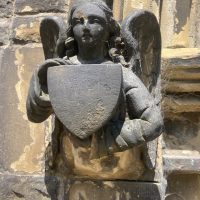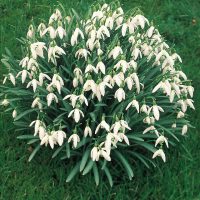Prayers of Approach
Lord God, you have the bread of life for the hungry and living water for the thirsty. We come hungry and thirsty for your word, with a desire to know your will and to love with your unconditional love. Help us to be fed and to learn from you.
We thank and praise you, Lord God, that despite our assumptions and judgements and the way we sometimes treat others, you never stop loving us. Bread of life, you are always with us. We praise you that as we draw near to you, you quench our thirst and satisfy our hunger, so that we never need hunger or thirst again. Thank you that you equip us and resource us with everything we need for this journey of life. We thank and praise you, Lord God.
Bread of life, complete sustainer, provider of all that we need, we come before you – seeking you, believing and trusting – so that we may never hunger and thirst again. Amen.
Hymn To God be the glory, great things he has done (R&S 289)
Readings: 1 Kings 19:4-8
John 6:35, 41-51
Introduction
Elijah is fresh from his triumph over the priests of Baal and their champions, Ahaz and Jezebel. And rather than being full of the energy of triumph, he is fit to die and would gladly expire under the broom tree. But God has other ideas. So, here we have another desert feeding. And the purpose of this one is that the prophet will have the energy for a 40-day journey, at the end of which he will meet God at Horeb. There are echoes here of the exodus, anticipations of second Isaiah and his word about getting ready for a journey, and maybe even preparation for what Jesus has to say about the bread of life.
When Jesus describes himself as the living bread and invites us to eat his flesh his hearers find this contentious especially when he makes the link between eating his flesh and receiving eternal life. In getting caught up in this ‘Q&A’ session with the crowd, which began in last week’s readings and continues in next week’s as we follow the chapter through, he can see that they are constrained by their history and by what they think they know about him. He tests the limits of their thinking by offering something radical and new. How might we have responded to his words?
Hymn Jesus the Lord says, ‘I am the bread…’ (R&S 199)
Sermon
With this week’s readings we are in the middle of a series exploring the themes of bread and what it means to be fed and nourished by God, both physically and spiritually by his word. Two weeks ago we heard about Elisha feeding 100 people and Jesus feeding 5000, last week it was Moses and the ‘manna’ from heaven and the crowds following Jesus because they had been fed, this week we read of Elijah being fed so that he has strength to go on to Mount Horeb to meet with God and Jesus describing himself as the ‘bread of life’ declaring that whoever eats this bread will never be hungry. This was introduced at the end of last week’s passage and is further developed this week as Jesus explains that he is the true ‘bread that came down from heaven’ concluding with the statement that the bread which he will give for the life of the world is his flesh, an idea which will be further explored next week.
When Jesus describes himself as the ‘bread of life’, it causes consternation among the Jewish crowd. There is a very real sense of disbelief that the son of a local carpenter could talk like this, about having come from heaven. Jesus explains his claim by comparing himself to the bread that their ancestors and Moses received in the desert. His final declaration however is truly shocking – the bread is my flesh! You can almost hear the gasps from the crowd. Quite apart from the question that will be asked next week, how can someone give anyone their flesh to eat, eating human flesh and drinking blood is total anathema, completely and utterly unthinkable.
John’s gospel is all about the ‘signs’ that point to Jesus as the Messiah, the son of God. The crowd may have been well fed earlier on the other side of the lake but have they learned anything about God and the way he acts in the world? Jesus’ words seem completely puzzling but they challenge his listeners to make connections. Just consider the role bread plays in this story and in the Bible more generally. We might ask ourselves, ‘Is there always a link between a square meal and spiritual nourishment?’ In many of the stories about bread the provision of our physical needs is an invitation from God to get to know him better. John offers us signs or clues in his story that help us to do just that.
When the Jewish leaders who had been listening to Jesus asked, ‘Who does he think he is?’, they had conveniently forgotten that their own history was full of unlikely people, chosen and empowered by God to do God’s work. Their assumptions about the nature of the long-awaited Messiah prevented them from recognising him when he came. Who had they been expecting? God chooses those who appear the least likely to do the job on their own, testing our faith in him and in ourselves.
In a similar way, we heard how Elijah in his despair had declared himself ‘no better than my ancestors’. Yet out of his tiredness and hunger God awoke him, fed him and sent him off to do great things well beyond the limits of what he could have achieved in his own strength.
God offers the same to each of us, for in a relationship with Jesus there should be no limits to what we can do together. Yet we are quick to limit ourselves and others. We all live within the constraints of our assumptions, quickly judging people and situations on very little evidence or experience. Would you have recognised Jesus in his earthly ministry as being the Messiah, the ‘bread of life’? Do we recognise him today?
Jesus referred his listeners back to the manna that God had provided from heaven, and which came daily to feed their physical needs. The bread of life that Jesus offers is to be enough for each day, but it is also part of the long-term diet plan that builds us up and sustains us for the journey of eternal life.
Hymn Seek ye first the kingdom of God (R&S 512)
Prayers of Intercession
Jesus, you told your followers that whoever comes to you will never be hungry, and whoever believes in you will never be thirsty. We still live among those who are hungry and thirsty for bread and water and who also seek you. In a world full of misinformation and false assumptions, help us to live in response to your promises, and to show your love more clearly, that you may be found in us.
God of all, whose Son suffered on the cross, we pray for those who find themselves in places of flesh and blood today: those in war zones, those in places where terrorist bombs cause devastation, those first to discover the bodies in areas where there have been massacres. Lord, bring peace, bring reconciliation.
We pray for those who work in hospitals; we give thanks for those whose donated blood offers life to others. Lord, bring healing, bring joy.
We pray for those who work in difficult and dangerous places and situations, where there is roughness and little pity or concern for others. Lord, bring change, bring gentleness.
We pray for those who call others to gather around the Communion table, those who break bread and share wine. Lord, bring inclusiveness, bring life.
Lord, in all places, and to all creation, bring life eternal. Amen.
Hymn Guide me O thou great Jehovah (R&S 345)
Blessing
May God make you wise in your understanding, bold in your proclaiming, generous in your sharing, humble in your receiving and loving to those at your table.
And may his blessing rest on you, now and evermore. Amen.
Prayers and other material (adapted) © Roots for Churches Ltd. Used by permission.






